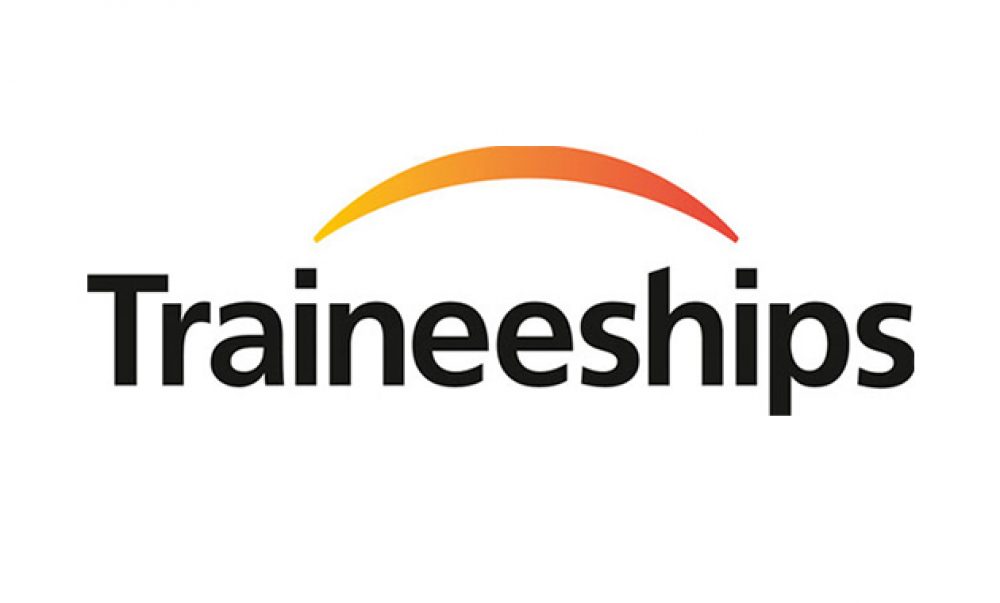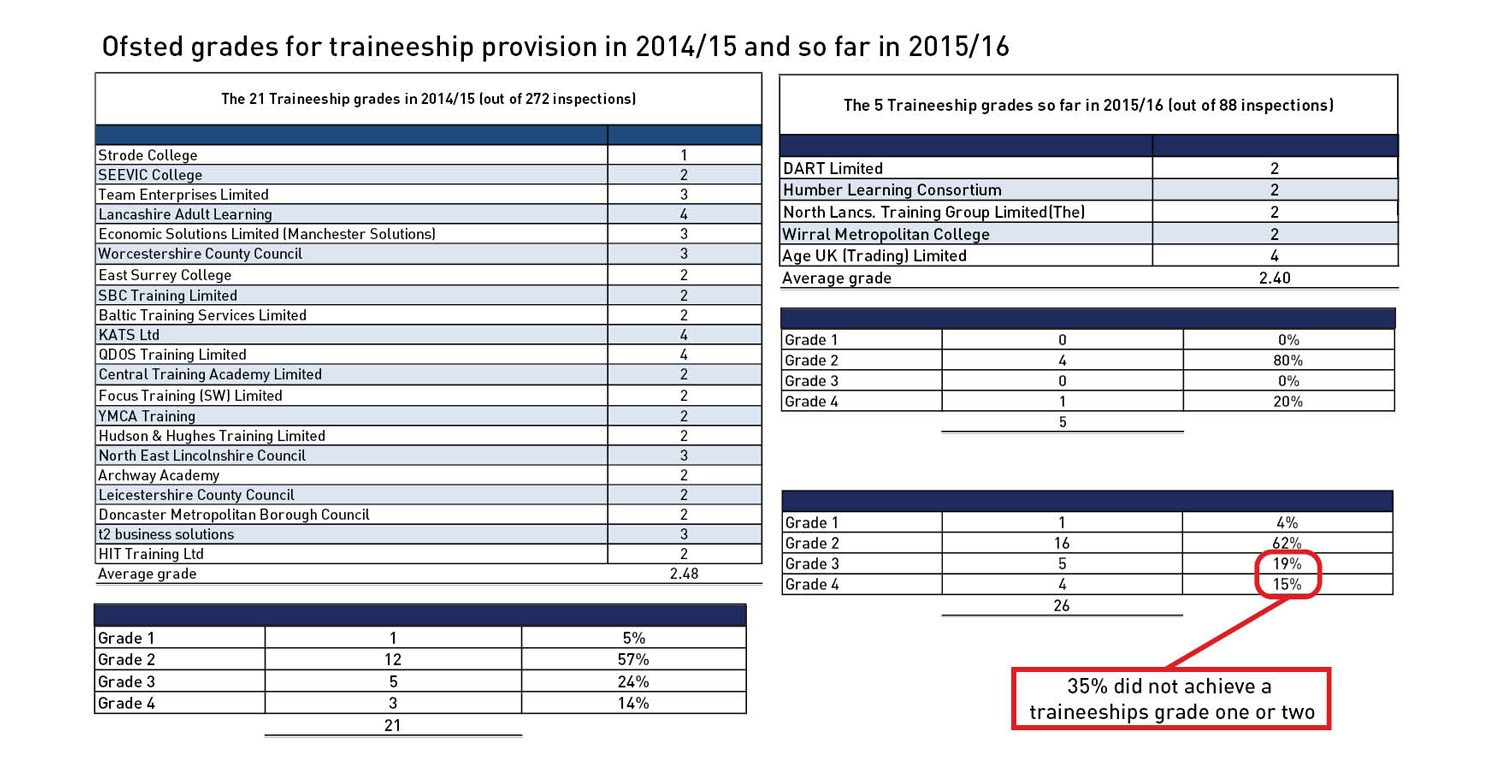As restrictions are lifted on delivering traineeships, with the government claiming excellent results mean they are no longer needed, questions remain over quality. The change has led to accusations that the Government is “desperate for numbers”.
Until last Monday, only providers rated “outstanding” or “good” could deliver traineeships. However, provision has now been opened up to providers who have been rated as “requires improvement” or “inadequate” by Ofsted.

According to the Government, the earlier restriction was to “ensure quality from the outset” and the change has brought traineeships in line with rest of FE and skills provision.
“Now that traineeships are fully established and getting excellent results for young people, from 2016/17 we will place them on a par with other provision by removing this requirement,” the Government said in its English Apprenticeships: Our 2020 Vision report, published in December.
Its own evaluation of traineeships focused on outcomes, and did not address the quality of provision. “Around two thirds of trainees progressed to positive destinations including apprenticeships,” said the 2020 Vision report.
In addition, “94 per cent of employers consider traineeships to be an effective way of preparing young people for work”.
When asked by FE Week about the quality of provision, as judged by Ofsted, the Government remained silent, so we took a look.
In 2014/15, just 21 out of 272 inspected providers received a grade for traineeships. Of those 21, five received a grade 3 (requires improvement) rating, and a further three had been slapped with a grade 4 (inadequate).
Since the introduction of the new Common Inspection Framework in September 2015, only five out of 88 inspections have included a grade for delivering traineeships. One of those five was a grade 4, while the remaining four were all grade 2.
This means since September 2014, of the grade one and two providers delivering traineeships that have been inspected, more than a third have subsequently been given a grade 3 or 4 rating for their traineeship provision.
“In my view, the Government has opened up the traineeship programme because they’re not recruiting enough people on it. They’re desperate for numbers,” said John Hyde, chair of HIT Training, which used to run traineeships.
Mr Hyde said that young people who could get a paid job would do so, leaving traineeships for those who “need more guidance to get a job”. Rather than open up provision to all providers, Mr Hyde said he believed it should be run by specialists.
“I think that is where the marketplace is now. Providers that are specialists in helping the hard to reach are the only people that will benefit from the Government opening up traineeship provision,” Mr Hyde said.
“For everybody to dabble in it, I think it’s going to be very messy and not produce really good results,” he added.
Andrew Cleaves, principal at Birmingham Metropolitan College, said he welcomed the opening up of traineeship provision. The college had been delivering a small number of traineeships, but was hit with a grade 3 rating from Ofsted in May last year.
“We have worked with a number of employers to design and deliver appropriate employability programmes that progress successful recruits on to jobs and apprenticeships.
“The traineeship brand will help us to deliver more training that can provide people with the skills they need to enter employment,” said Mr Cleaves.
Traineeships were introduced in 2013 for 16- to 24-year-olds as a pre-apprenticeship programme. According to provisional government figures, 7,600 people have started a traineeship so far in 2015/16. In 2014/15, there were 19,400 traineeship starts, up from 10,400 in 2013/14.
The restriction on delivering traineeships was due to have been lifted in August, the government had said in December, but the date was brought forward in January.
A spokesperson for the Department for Business, Innovation and Skills said it had nothing further to add beyond the information given in the 2020 Vision report. Ofsted confirmed that it had not carried out a thematic review into traineeships, but declined to comment further.
Click on the image for a larger version
For everybody to dabble in traineeships it will be very messy

John Hyde (pictured), the chair of HIT Training, explains why the company no longer provides traineeships and why the government is wrong to open the programme up to all providers.
In my view, the government has opened up the traineeship programme because they’re not recruiting enough people on it. They’re desperate for numbers.
The economy has improved since the programme started. There are a lot of entry level jobs available, so if young people want to work there is work now for them.
I can’t see the programme lasting much longer. There is no incentive to young people to sign up for a traineeship.
Why would a young person commit themselves to up to six months in a traineeship with no pay, when they could get paid straightaway in a job at which the employer would have to train them anyway?
So you get young people who are “hard to help” doing traineeships – the ones who need more guidance to get a job. Those are certainly the kind of young people we were getting in the last few months we were running the programme.
The problem was that our staff weren’t geared up or trained for that. We came into it as mainstream provider, not as a specialist unemployment provider working with the hard to reach.
We saw it as a service to the hospitality industry and not as a service for the hard to help.
I think that is where the marketplace is now. Providers that are specialists in helping the hard to reach are the only people that will benefit from the government opening up traineeship provision.
It’s not an easy programme to run. You need expertise in dealing with employers, and the ability to work with the employers to offer places for people that are reluctant, or unable, to get a job without the existence of this programme.
Essentially, you need two specific sets of skills. You need employer liaison people, who can sell the programme and the young person to the employer. And then you need the specialists that can prepare that person, from whatever background or social problems they’ve come from.
That’s why you need specialist providers. For everybody to dabble in it, I think it’s going to be very messy and not produce really good results.
You’re going to get more disappointed young people who are not getting the expertise from a specialist provider that they need to get them back into work.
We went into delivering traineeships because we thought it was a good way for unemployed teenagers to come into the hospitality sector. It was to be sold to them as a way of getting qualifications and a job.
That was our entire raison d’etre for doing them – to get young people into a job, with work experience, so they could get full-time employment. There was no upper limit to the number of traineeships we were going to offer. It was our intention to have a traineeship team in each of our 40 offices around the country.
However, when we were inspected by Ofsted we found they didn’t really understood what a quality traineeship is.
The inspectors were looking for classroom teaching, rather than practical job outcomes and work experience. They were more concerned about our numeracy and literacy results rather than whether our trainees found jobs.
The problem was the trainees weren’t on the programme long enough. Once they’d finished the initial assessment and preparation for work, they were with the employer all day. There was no day release programme then, so the actual training would take place with a member of our staff visiting them at the workplace.
Although we got an overall grade 2 rating from Ofsted, we were given a grade 3 for our traineeship provision.
We then took the decision to stop running traineeships completely, which meant having to make 80 members of staff redundant. We managed to relocate half of them within HIT and found jobs for a further quarter, and we know the remainder are all in work.
I can’t see the programme lasting much longer. There is no incentive to young people to sign up for a traineeship. I don’t think their benefits are stopped, but equally there’s no cash advantage to them doing a traineeship.









Your thoughts